Colorado COVID-19 Updates: Omicron took two weeks to make up 90+ percent of cases

Governor Jared Polis and health leaders regularly give updates on the COVID-19 virus in Colorado and ongoing efforts for the state to contain it. See below for the latest updates.
November 2, 2021 governor's press conference
Current COVID-19 numbers in Colorado:
- 1,847 hospitalizations across the state. Over 80% of those people are unvaccinated.
- 27 children are hospitalized, 20 are ages 0-11.
One in 51 Coloradans are contagious with COVID
As COVID infections increase throughout Colorado, the state is now ranking fifth in the nation for COVID transmission. "One in 51 Coloradans are contagious with COVID as we speak, " the governor said. Right now, 1,847 people are hospitalized in the state and over 80% of the people hospitalized are unvaccinated.
"If you were unvaccinated a regular trip to the grocery store, a night out to dinner are more dangerous than they have been at any point in this pandemic for you," the governor said. "The Delta variant is brutally effective at seeking out the unvaccinated like a laser guided missiles, infecting them and often killing them."
In addition to urging Coloradans to receive one of the three COVID-19 vaccines, Governor Polis encouraged those who have already received the two vaccines (one if Johnson & Johnson) to get their booster shot. "They all work in combination," the governor said.
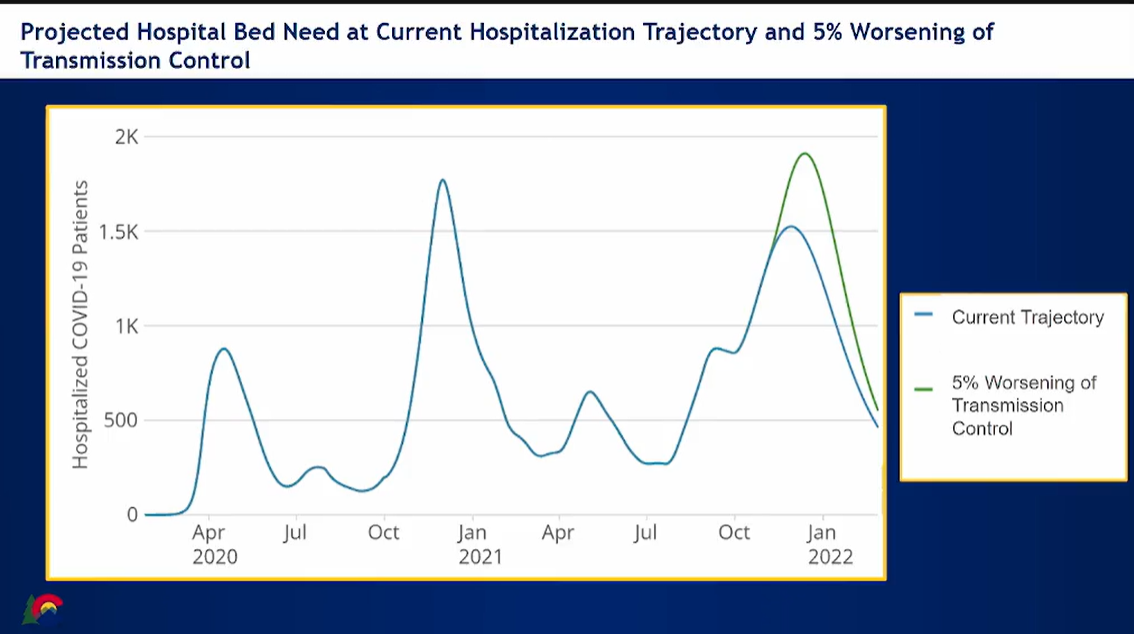
Since July, "We have not seen any deaths occur among that 12 to 39 year old population among vaccinated individuals," according to state epidemiologist Dr. Rachel Herlihy. However, with waning immunity, vaccine effectiveness in older Coloradans is decreasing.
Based on the data Herlihy provided, hospitalizations will continue to increase with peak hospitalizations at about 1,500 by early December. "If we see a worsening in transmission control, that number gets closer to 1,900 in the state," Herlihy said. Polis added that these hospitalizations will continue to add unnecessary stress on our hospitals and their staff.
November 5, 2021 CDPHE press conference
Current COVID-19 numbers in Colorado:
- Fewer than 100 ICU beds available right now
- 1,267 people are currently hospitalized with COVID-19 (the highest peak of the pandemic so far was 1,847)
- 80% of those currently hospitalized are unvaccinated
- 10 of the last 14 days have had an upward trend in case numbers
"With the amount of COVID in our community and in our state at this point really do want to make sure people are being careful. Wear a mask when you're indoors, if you're sick, stay home and get tested," said Scott Bookman, the COVID-19 incident commander with the Colorado Department of Public Health and Environment.
Bookman went on to say there are several factors to why there are so few hospital beds available. He said a number of delays to care or surgeries from the beginning of the pandemic to now, the return to almost normalcy of people's lives, behavioral health demands and the increasing number of COVID cases have all contributed to a low number of beds available.
This week the Colorado Hospital Association activated tier three of combined hospital transfers to address capacity concerns. This allows for the quicker transfer of patients to hospitals that may have more room or more specialized care. Part of the speed also comes from this level now allowing doctors to transfer patients without first getting the patient's consent. You can read more about that here.
November 12, 2021 governor's press conference
Current COVID-19 numbers in Colorado:
- 1,476 Coloradans are hospitalized
- 95% of ICU beds are in use, leaving just 72 ICU beds available
- 19% of those hospitalized are people who are vaccinated, 81% of those hospitalized are unvaccinated
- Five children ages 12-17 are hospitalized
- 25 kids 11 years old or younger are in the hospital with COVID
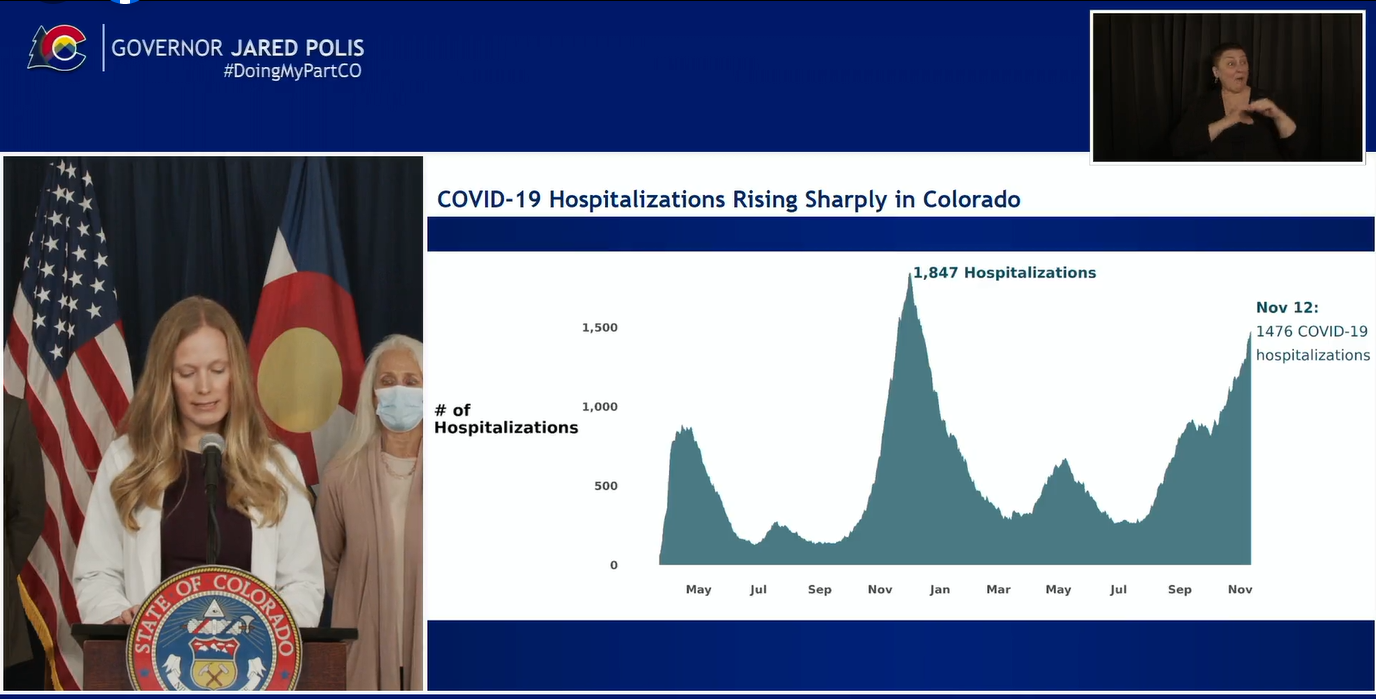
To find more data about COVID-19 in our state, visit the state's data website.
No mandates on masks
With hospitalizations at the highest peak since last December, questions of Polis possibility instituting a new mask mandate came up during the press conference. Polis in response continued to push for people get COVID-19 shots and boosters.
"We are encouraging mask wearing indoors around others with COVID levels this high, especially if you're unvaccinated; but it is a good practice for an additional layer of protection for the fully vaccinated as well," said Polis.
However he did not announce a reinstated mask mandate for the state. He did mention how individual cities and towns in the state have made that requirement once again, but he would not be doing so at this time because "it's a little harder to see through the static of the impact of that."
Polis gave an example of New Mexico, which has had a mask mandate in place for the last few months and was recently renewed. Polis said infection rates there in New Mexico have tracked at about the same pace as Colorado while that mandate was in place for our neighbors to the south.
"It's a little bit harder to figure out what a mask order does in different areas and what impact that might have. One hypothesis is that those who are unvaccinated are the least likely to follow a mask order. And obviously if we're trying to get them to do one thing, it would be to get vaccinated," said Polis.
So the governor continued to push for more vaccinations and said if we, as a state, had been more fully vaccinated six or eight weeks ago we would not be seeing this current spike.
Overall, Polis' message to the unvaccinated: "Whatever that reason is just suck it up and get protected, this thing isn't going to go away."
Push for more monoclonal antibody treatments
During the press conference, Polis mostly focused on the advantages of using monoclonal antibody treatment (mAb). Some early evidence suggests that mAb treatment can reduce the amount of the the virus that causes COVID-19 in a person's system. This would mean having milder symptoms and decreasing the likelihood of needing to go to the hospital.
"What I want people to know is that this is for people after you get a positive result on a test, but before you're so sick you're in a hospital," said Polis. "It's too late when you're so sick you're in the hospital."
The governor then went on to explain that getting vaccinated is the best line of defense against this virus. Still, mAb can significantly reduce the number of people hospitalized.
Below is a list of factors that can make a person eligibly for mAb. They include experiencing symptoms and being at a high risk of more serious symptoms.
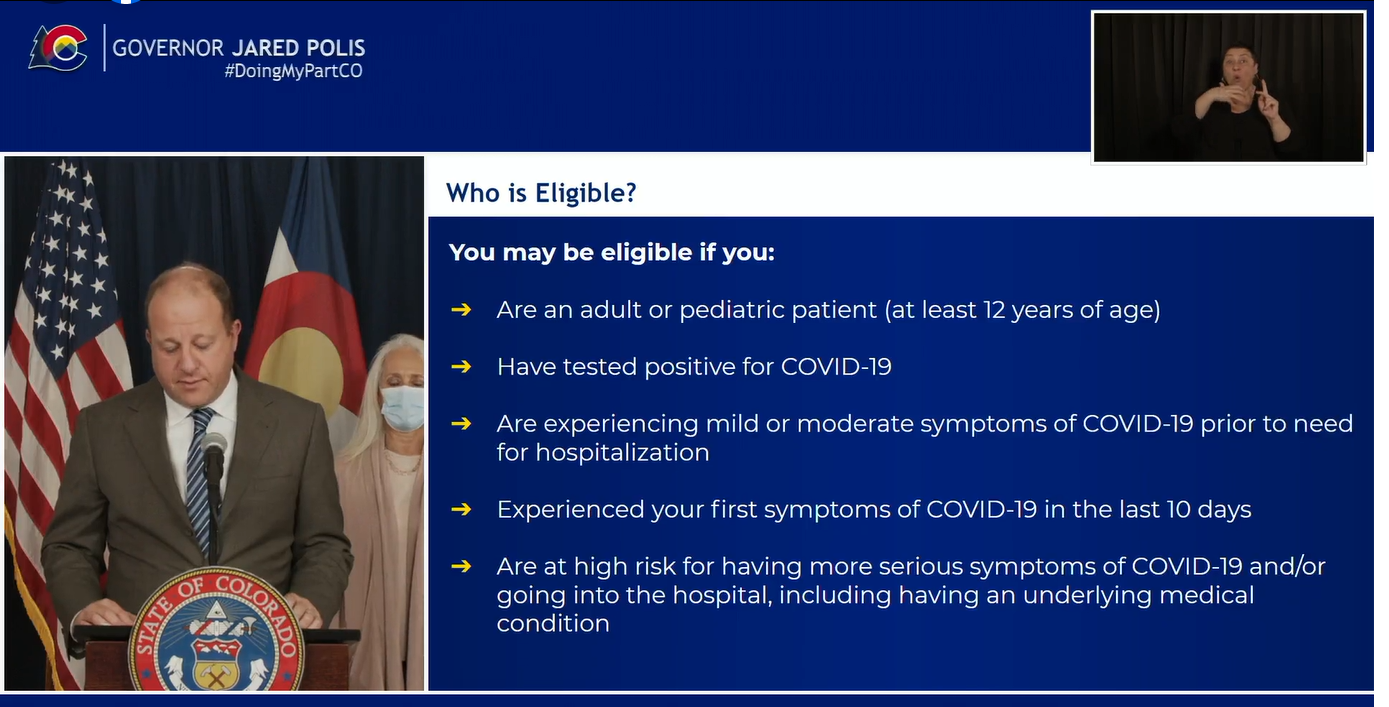
There are more than 160 enrolled providers of the treatment throughout the state. The state currently has five mobile mAb treatment buses and is planning to launch five more soon. You can find more information about the treatment and locations that offer it on the state's website.
The push for this treatment is part of the state's plan to reduce the strain on hospitals right now. Dr. Rachel Herlihy, the state epidemiologist, said the Colorado Department of Public Health and Environment (CDPHE) has been working on modeling forecasts for hospitalizations.
"This figure shows you the range of possibilities of hospitalization numbers when our team ran hundreds of simulations for our model for two different scenarios," said Dr. Herlihy. One is the current use of mAb in the state, that model is in the light blue below. The second scenario is 50% of people who are eligible for mAb receive it, that is shown in green.
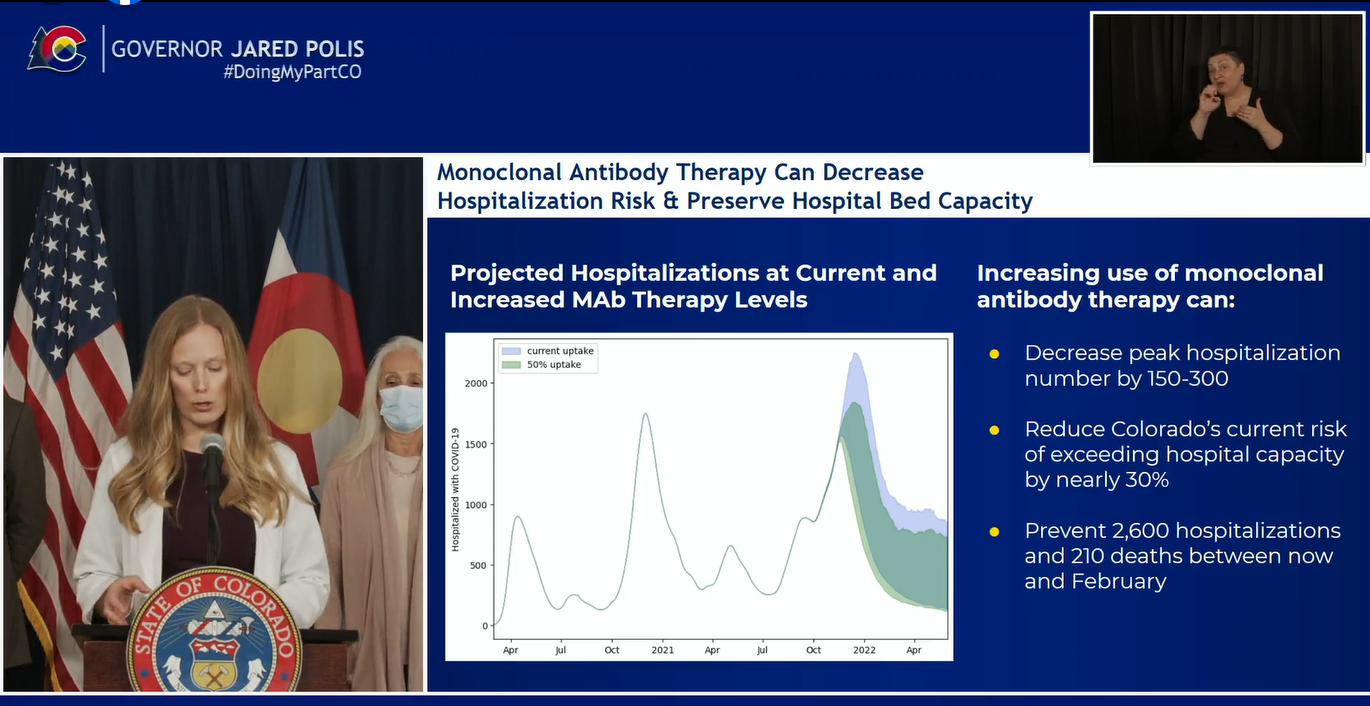
As shown on the slide above, this increase of use could prevent 2,600 hospitalizations and 210 deaths between now and February. It could also reduce the risk of exceeding Colorado's hospital capacity by 30 percent.
To speak from a personal angle of mAb, Jill Lester shared her story during the press conference. She said both she and her husband we fully vaccinated by March. Then in July, her husband came down with COVID-19 after a short trip to the mountains.
"Thanks to mAB, my husband felt significantly better within hours of the treatment and fully recovered his health several weeks later," said Lester.
She then came down with COVID-19 shortly after her husband. She also felt significant symptoms and sought mAb treatment.
"The transfusion went very smoothly. And while it took me a couple of days to begin feeling better, I then quickly and fully recovered," explained Lester.
Read about previous press conferences below
November 17, 2021 CDPHE press conference
Current COVID-19 numbers in Colorado:
- Fewer than 100 ICU beds available right now
- 1,470 people are currently hospitalized with COVID-19 (the highest peak of the pandemic so far was 1,847)
- 80% of those currently hospitalized are unvaccinated
- The highest rate of COVID-19 cases are in the 5-11 year old population
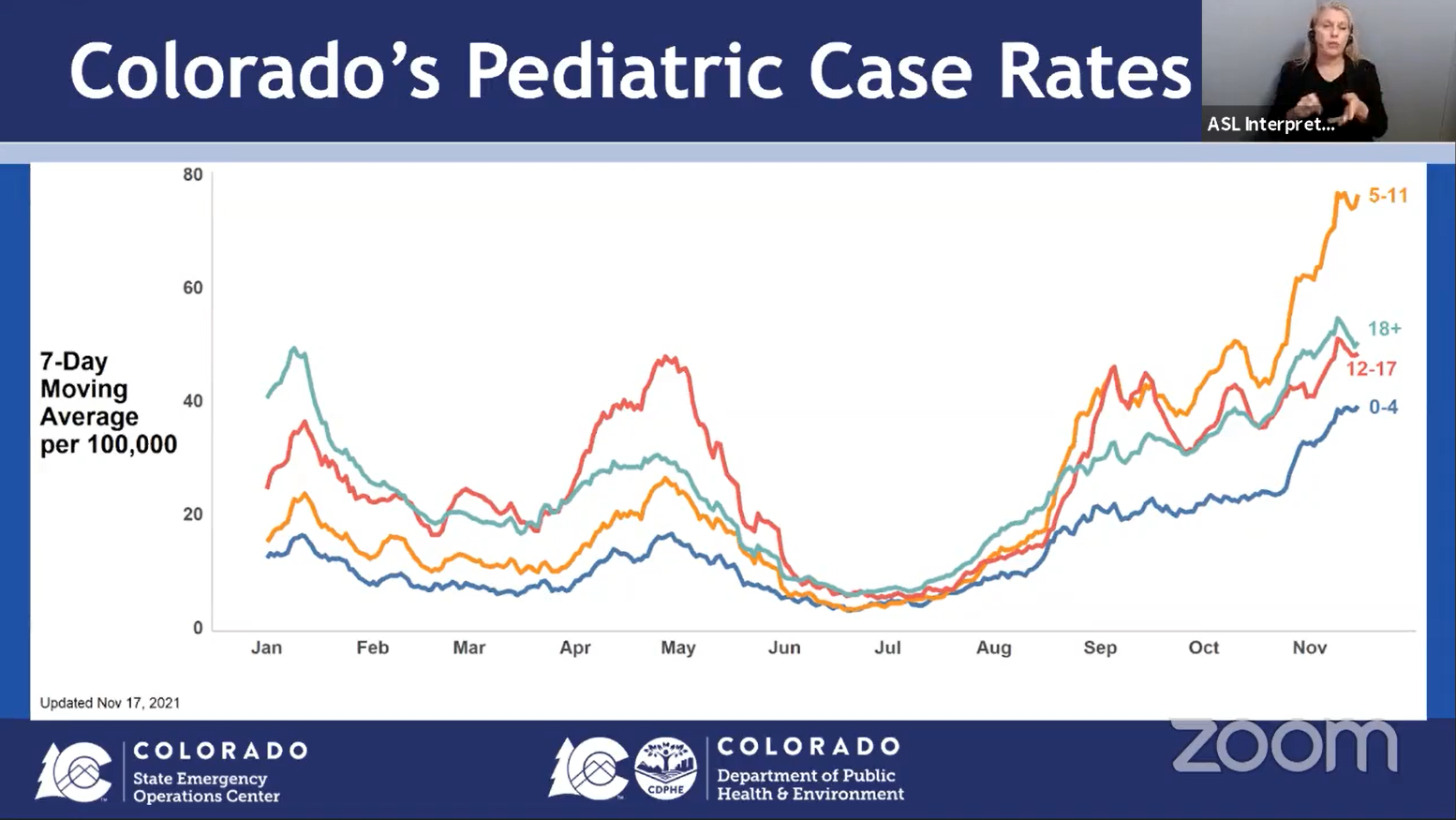
Colorado is struggling to contain the spread of COVID-19. As of November 17, data from The New York Times shows Colorado has the tenth-worse per-capita rate of COVID-19 in the country. Governor Polis, though, has so far declined to reissue a statewide mask mandate.
During the November 17 media call, CDPHE's Covid-19 Incident Commander Scott Bookman said, "We should all be wearing masks right now, whether there is a mandate or not."
Bookman also spoke about the strain unvaccinated people are putting on the state's health care systems. Currently about 80% of COVID-19 hospitalizations in Colorado are unvaccinated people. He said hospital capacity is "so, so threatened." The latest data from CDPHE show fewer than 10% of ICU beds across the state are available across the state.
You can watch the full update from CDPHE below.
November 19, 2021 governor's press conference
Current COVID-19 numbers in Colorado:
- 1,518 people are currently hospitalized with COVID-19
- 1,244 of those hospitalized are not vaccinated
- 11 kids ages 0-11 while nine kids ages 12-17 are hospitalized
- 9,120 Coloradans have died from COVID-19 so far
- 1 out of every 38 unvaccinated Coloradans is infected with COVID-19
- 1 out of every 62 Coloradans is infected with COVID-19
- More than 81% of eligible adults and nearly 37% of 5-17-year-olds have received at least one dose of the vaccine
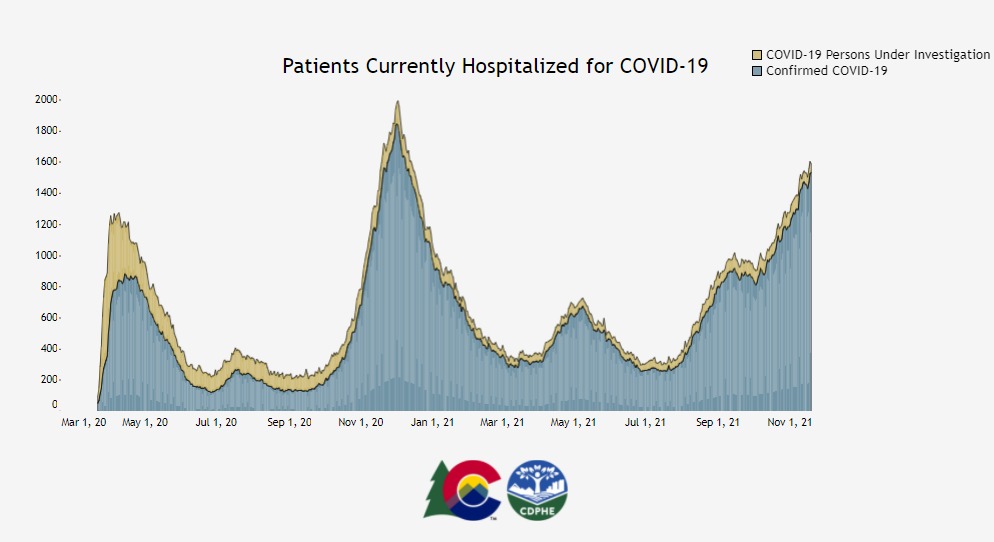
Expanding access to monoclonal antibody treatment
The state is expanding access to monoclonal antibody treatment (mAb) to help relieve hospitals. Some evidence suggests that mAb treatment can reduce the amount of the the virus that causes COVID-19 in a person's system. This would mean having milder symptoms and decreasing the likelihood of needing to go to the hospital.
Polis said now people can get mAb without a doctor's referral. He said the goal for this expansion is to help reduce the strain on hospitals and prevent them from getting overwhelmed. He also said there is currently a great supply of mAb thanks to a bump from the federal government, so access is able to expand.
"This is for you in the first week of your infection. It's too late once you're hospitalized," said Polis. "Once you're diagnosed and at a higher-risk individual meaning anybody, of course 60s, 70s, 80s but it could be a 52-year-old with moderate asthma, a 56-year-old with diabetes also very good candidates for monoclonal antibody treatment."
One reporter did ask if there was a concern that there would be an abuse of the system, as in someone who doesn't truly need the treatment getting it. The governor said the state had the same concerns when designing this program so they kept that in mind.
"First of all, of course demonstration that you have COVID needs to be done and that you were diagnosed, you got it within in 10 days," said Polis. "Secondly, there are easily verifiable conditions that make you a good candidate for monoclonal antibody treatment like age."
Polis continued to say this sort of trust was given to the public when the state first rolled out COVID-19 vaccinations and if people were immunocompromised they had to attest to that truthfully.
Starting on Monday, anyone can call 1-800-268-2926 to find out if they're eligible for the treatment and sign up for it. You can find out more information by visiting this website.
Still, no statewide mask mandate
Given the risk of overrunning our state's hospitals, reporters asked the governor once again about mask mandates. Since this summer, Polis has not given any indication that he would reinstate one for schools or for the state in general.
During Friday's news conference he made it clear, again, that a mask mandate is not part of his plan any time soon. He said the state is in a different kind of health emergency now as opposed to this time last year, citing more tools at our disposal to fight COVID-19. Primarily his push has been for everyone to get the COVID-19 vaccine.
"At this point in the public health pandemic with most people protected, it is no longer a proper role of the state to require you to wear something at a particular place at a particular time," said Polis.
However, he said he and his office supports any local government that does institute a mask mandate at this time.
November 23, 2021 governor's press conference
Current COVID-19 numbers in Colorado:
- 1,576 people are hospitalized with COVID-19
- 256 of those hospitalized are vaccinated
- 1,320 of those hospitalized are unvaccinated
- 9,219 Coloradans have died from COVID-19
- 19 kids ages 0-11 are hospitalized
- 12 kids ages 12-17 are hospitalized
- 39% of kids 5-17 have at least one dose of a COVID vaccine
State vs. local control on mask mandates
Governor Polis was questioned in several ways and several times about a statewide mask mandate. This week various metro area counties reinstituted mask mandates due to surging COVID-19 cases and diminishing hospital capacities. Polis made it clear he would not be issuing a statewide mask mandate.
"We've taken a line here where we are supportive of our local communities in recognition that we have a very diverse state. I would never ban local jurisdictions from issuing public safety requirements, and I don't want to force them to either given that we have a vaccine that is over 90 percent effective which is the big change from where we were," said Polis.
This is the general theme the governor reiterated several times...we have a diverse state and given the vaccine we're in a different place than before. He also emphasized the drama of mask mandates is getting lost at the important message from health leaders which is wear a mask if you're in an indoor crowded area.
"Here's the challenge there is still 19% of Coloradans that have 14 times greater risk," said Polis referring to the percentage of adults in our state still unvaccinated. "And the decision of how we address that — there is no right or wrong answer. I hear, you know, from people all over. Some people say it's their fault let them die, others says no we love them we want to offer them a higher level of protection. Others say its their fault but when they're filling our hospitals close to capacity, it's time for legal or regional action."
Overall, the governor said the state supports local governments no matter what their decision is on things like mask mandates.
Polis also told Coloradans that if they're all vaccinated they can gather for Thanksgiving with little to no worry, and if anyone is experiencing COVID-like symptoms to not join in group gatherings for the holiday.
December 16, 2021 governor's press conference
Current COVID-19 numbers in Colorado:
- 1,227 people are hospitalized with COVID-19
- 14% or 176 of those who are hospitalized have been vaccinated
- 81% of Coloradans ages 12 and up have had at least one dose of a COVID-19 vaccine
- Five cases of the Omicron variant have been confirmed in Colorado
- The state believes it has identified first community-spread case of Omicron
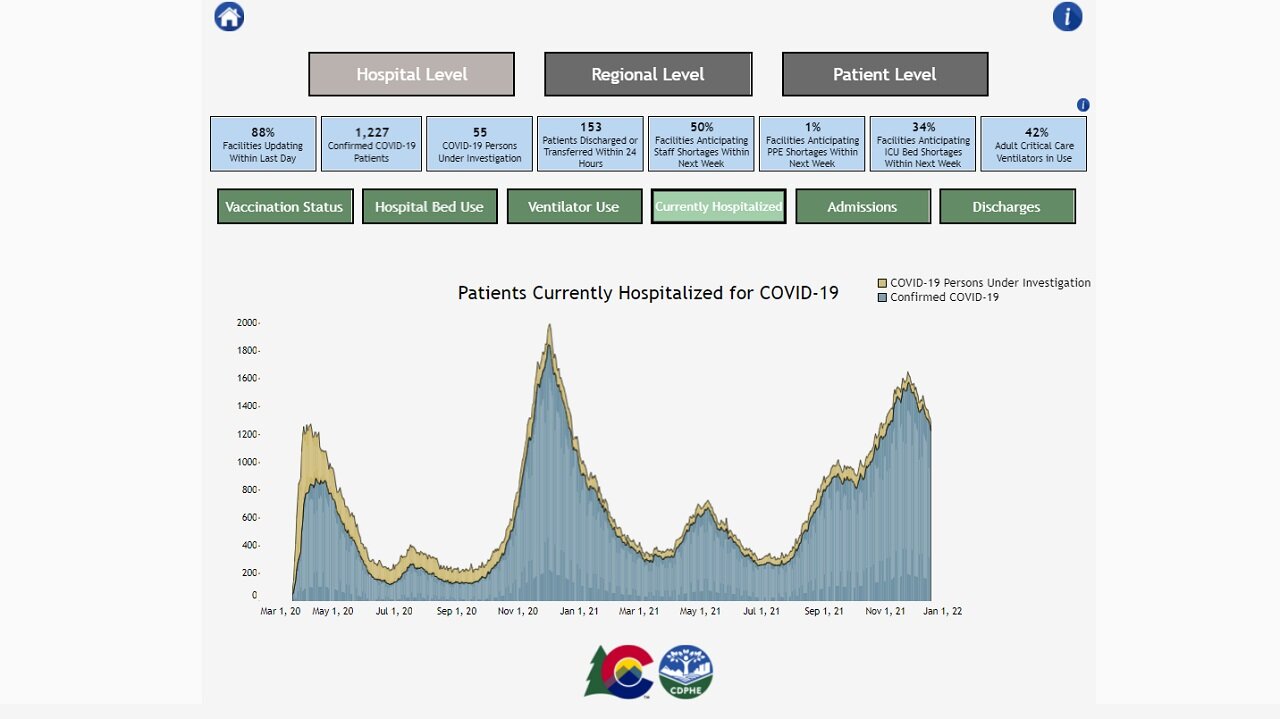
Push for booster shots as Colorado sees first Omicron case of community-spread
During the press conference on December 16, Polis was joined by Aurora Mayor Mike Coffman at the Aurora Municipal Center, one of several community vaccine sites. Both leaders reiterated the importance of not only getting vaccinated but also receiving the booster shot. Studies have shown the initial doses of a COVID-19 vaccine aren't as effective against preventing disease with the latest COVID-19 variant, Omicron, but the booster dose is more effective.
"Most of the people going through these [community vaccine] sites are getting their booster which is more important than ever before because of the Omicron variant," said Polis.
He reiterated warnings that we have seen before with other variants, like Delta, when he said Omicron will likely become the leading variant of COVID-19 cases in the state. That theory was further supported when the governor announced state health officials believe they've identified the first Omicron case from community-spread in Colorado.
"What do we know? We know vaccinations and boosters work to protect people again Omicron," said Polis encouraging everyone to get their vaccine and booster six months later. "The life of every Coloradan matters."
You can find a list of vaccine locations on the state's website: covid19.colorado.gov/vaccinefinder.
December 21, 2021 governor's press conference
Current COVID-19 numbers in Colorado:
- 1,030 people are hospitalized with COVID-19
- 860 of those who are hospitalized are unvaccinated
- 72.6% of all Coloradans have had at least one dose of a COVID vaccine
- 40.9% of adults in the state have received a third dose
Preparing for Omicron to become dominant variant
The state has confirmed community spread of the Omicron variant in Colorado. Only five cases are listed on the Colorado Department of Public Health and Environment (CDPHE) website. However, the city and county of Denver announced on Dec. 21 it had confirmed two cases of the Omicron variant and those were not yet listed on the CDPHE website. Polis said getting vaccinated and a booster dose is our best defense against this new variant.
"We need to stop thinking about it as an optional dose. While the CDC has not yet changed the definition of fully vaccinated to include the third dose, I believe based on the data they will," said Polis. "Don't put off getting your third dose. It will provide you with significant protection against Omicron, which we expect will fully increase in our state in the coming weeks, so get that now."
The governor does not expect to make a statewide mask mandate with Omicron expected to increase. He is sticking to allowing local governments to make that decision and once again said the best defense was to get vaccinated. Polis did say the state is preparing for the influx of testing that will be needed with new large testing and vaccination sites. The sites pictured below will be opening the week after Christmas and specific hours will be announced at a later time.
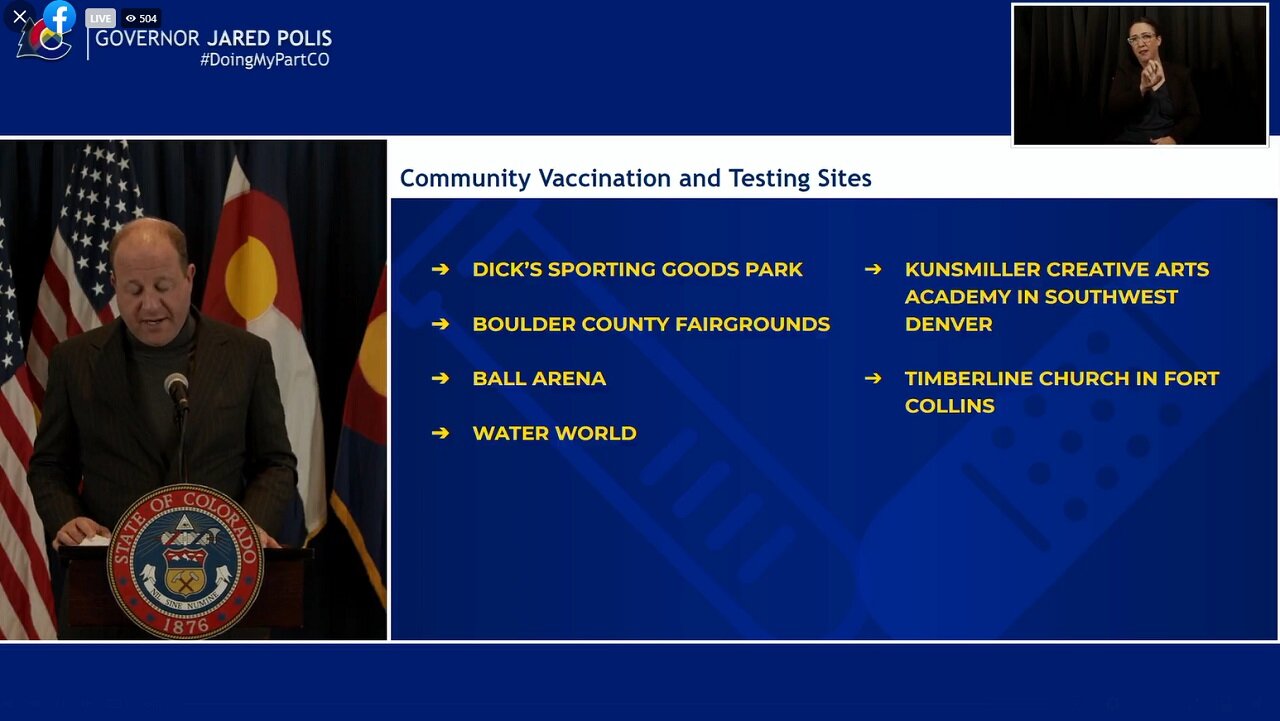
Polis also celebrated the success of the state's at-home testing program. He said as of Dec. 21 more than 1.3 million Binax tests have been delivered to Coloradans for free. He emphasized these free test kits are great for screening but if someone is experiencing symptoms to go to a community testing site right away.
"Make sure you're not the one to bring COVID as an unwelcomed gift to Christmas to others," said Polis.
Visit covid19.colorado.gov/testing to find out more about testing.